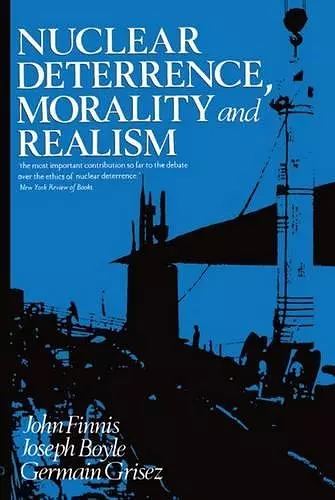Nuclear Deterrence, Morality and Realism
Joseph Boyle author John Finnis author Germain Grisez author
Format:Paperback
Publisher:Oxford University Press
Published:14th Jul '88
Currently unavailable, and unfortunately no date known when it will be back

Nuclear deterrence requires objective ethical analysis. In providing it, the authors face realities - the Soviet threat, possible nuclear holocaust, strategic imperatives - but they also unmask moral evasions - deterrence cannot be bluff, pure counterforce, the lesser (or greater) evil, or a step towards disarmament. They conclude that the deterrent is unjustifiable and examine the new question of conscience that this raises for everyone.
' more coherent than many such multiple author ventures. The book will certainly become a source text for the anti-nuclear lobby.' The RUSI Journal
'a most careful and meticulous study of one of the most agonising moral problems of our times.' Month
'a formidable challenge to the moral legitimacy of nuclear deterrence ... exceptionally important ... they write from a well defined and carefully presented position.' The Tablet
' It is the most important contribution so far to the debate over the ethics of nuclear deterrence.' New York Review of Books
'Its philosophical quality is high; its treatment of strategic matters highly competent; ... a challenge to all who read the detailed arguments carefully, whether they be supporters or opponents of nuclear deterrence.' Millenium
'truly remarkable book ... deeply felt, clearly written and precisely argued book about fundamental issues.' Philosophica
'The clarity and precision with which the authors set out the arguments and difficulties should attract everyone concerned about the morality of nuclear deterrence ... This rigorous yet highly readable book compels us to think carefully through the arguments.' Defence and Disarmament
' This book is an important and carefully argued addition to a resurgent literature on the morality of nuclear deterrence. ... the book lives in the mind for the compelling challenge it throws out, through its totally convincing attack on consequentialism, to all those who would justify or condemn nuclear deterrence. It consigns broad acres of past debate to the flames.' The Round Table
'This truly remarkable book ... this deeply felt, clearly written and precisely argued book about fundamental issues.' Philosophica
'probably the most important book in this field [for] ten years ... rigorous yet highly readable.' International Affairs
'a important book, even a great one ... should be required reading on every seminary syllabus.' New Blackfriars
'What compels attention ... is the breadth and dedication of the authors' approach. In my view this book will not be surpassed as the case for unilateral nuclear disarmament. The depth and sophistication of its thinking, the purity of its logic and its style, and its sheer sense of intellectual adventure make it a most valuable addition to the literature. Peter Lomas, Journal of Strategic Studies
'a substantial work, the argument is forceful and the style clear. Richard Harries, Theology
'Long, tightly-argued and ambitious book ... the general theory and its specific application to nuclear deterrence form, when taken together, an impressive construction whose sheer analytical rigour and attention to detail mark it out from the great majority of contributions to the subject and go far towards justifying the authors' expressed confidence.' Studies in Christian Ethics
'This is a long and carefully argued book, which also includes an interesting account of moral theory, a survey of the moral and strategic literature on nuclear deterrence, and a discussion of the theological context of the authors' arguments.' Philosophy & Public Affairs, Winter 1990, Volume 19, Number 1
ISBN: 9780198247913
Dimensions: 216mm x 137mm x 25mm
Weight: 590g
444 pages